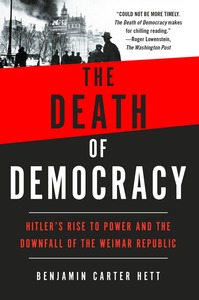You need to sign in or sign up before continuing.
Take a photo of a barcode or cover
142 reviews for:
The Death of Democracy: Hitler's Rise to Power and the Downfall of the Weimar Republic
Benjamin Carter Hett
142 reviews for:
The Death of Democracy: Hitler's Rise to Power and the Downfall of the Weimar Republic
Benjamin Carter Hett
informative
slow-paced
Not exactly a page-turner, but gave me an understanding of the period in Germany between the World Wars and how Hitler came to power. Frighteningly similar to our current regime in the US.
informative
reflective
medium-paced
Prescient and foretelling... perhaps hauntingly so.
challenging
dark
informative
fast-paced
informative
slow-paced
Eh...I don't want to rate this highly because it made me feel very anxious and worried while reading. I found I had to pause every few days to put this down and take a break before returning. If we weren't living in the world we are right now in America I would read this with a different lens, but alas. Unfortunately I saw far too many parallels between German politics and Hitler's actions in the 1930's with how second Trump administration is shaping up this past month+. The criticisms and hatred of 1930's Jews and Marxists vs. immigrants and DEI of 2025, the use of legal and constitutional executive actions granting more presidential power under the guise of "protection", and the propaganda and conspiracy theories. Hopefully we don't end up with the same result and our parallels diverge soon. I'll end this with quoting the last paragraph of this well-worthy read:
"Few Germans in 1933 could imagine Treblinka or Auschwitz, the mass shootings of Babi Yar or the death marches of the last months of the Second World War. Is it hard to blame them for not foreseeing the unthinkable. Yet their innocence failed them, and they were catastrophically wrong about their future. We who come later have one advantage over them: we have their example before us."
"Few Germans in 1933 could imagine Treblinka or Auschwitz, the mass shootings of Babi Yar or the death marches of the last months of the Second World War. Is it hard to blame them for not foreseeing the unthinkable. Yet their innocence failed them, and they were catastrophically wrong about their future. We who come later have one advantage over them: we have their example before us."
challenging
informative
slow-paced
Solid addition to the increasingly popular genre. It goes into too much detail for those interested in the general question of "how democracies die off". Also, some of the key statements (e.g. National Socialism as anti-globalisation protest) could have been elaborated a bit.
challenging
informative
medium-paced
Very informative and well written. I found lots of parallels between them and common day.
challenging
dark
informative
reflective
tense
medium-paced
this book was so fucking good and sooo fucking bleak
Tässä kirjassa ei ole paljoa uutta sotienvälisen Saksan/Euroopan historiaa tuntevalle. Se ei esitä esim. uutta tulkintaa Hitlerin valtaannoususta, mutta yksityiskohdissaan menee kyllä syvemmälle kuin moni yleisesitys. Kirjan heikkous ja vahvuus on sen keskittyminen lähes yksinomaan kulisseissa käytyihin kädenvääntöihin puoluekentällä. Se on heikkous, koska äänestäjien näkökulma jää vähälle huomiolle. Se on kuitenkin myös vahvuus, koska se alleviivaa sitä, että Hitlerin diktatuuri ei ollut mikään vääjäämätön demokratian tulos, vaan perinteiset porvaripuolueet (ja Hindenburg) ojensivat vallan Hitlerille. Vaihtoehtoja olisi ollut muitakin, mutta sosiaalidemokraattien ja kommunistien (joita Hett kuvaa parhaimmillaan yksinkertaistavasti) pelko oli suurempi tekijä kuin julkisesti antidemokraattisen Hitlerin pelko. Vuoteen 1932 tullessa ei myöskään ollut kenellekään epäselvää, että natsien alla ihmisoikeuksia ei enää olisi. Hett selittää pätevästi, miksi konservatiivit päätyivät ratkaisuunsa (ja sittemmin keskitysleireille tai salamurhatuksi), mutta massojen näkökulma olisi täydentänyt kirjaa hyvin.
Hett gives a succinct history on the democracy of the Weimar era, and the way the miscalculations of many people led to the suspension of the Constitution and the Nazi power grab. I'm not a scholar of history by any means, but Hett gives enough background context and detail without getting bogged down. This is one of many (so many!) examinations of the time, but this was written in 2018 to give particular emphasis to our current political situation, although he doesn't mention anyone by name. Where have we seen a democracy being undermined by a populist demagogue who is brought to power by conservatives who underestimate his lunacy in an attempt to stave off a center-left political alliance? Parallels? What parallels? He doesn't make a one to one comparison, perhaps not wanting to lose out by invocation of Godwin's law, but also because Hitler and the circumstances of the Weimar Republic really were sui generis. But one can hopefully learn something from history, which I've heard doesn't quite repeat itself as much as it rhymes.




